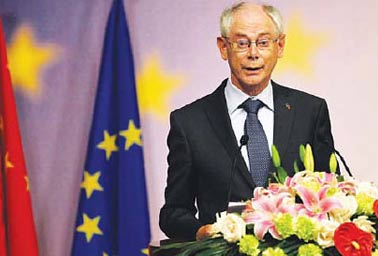EU allays fears over euro
Updated: 2011-05-20 10:19
By Li Xiaokun and Zhang Chunyan (China Daily)
European nations committed to cutting deficits, says Van Rompuy
|
 European Council President Herman Van Rompuy speaks at the China-Europe International Business School on May 18 in Shanghai. He said that the euro remains a strong, well trusted currency despite debt and deficit crises. [Eugene Hoshiko/Associated Press] |
Allaying fears over the safety of China's investments in Europe, a top European Union (EU) official has reassured Chinese officials on the health of the euro and indicated that the EU nations are committed to cutting deficits.
"All EU countries are bringing down public deficits. The most vulnerable countries are undertaking determined action to come out of the crisis," European Council President Herman Van Rompuy said in a speech at the Central Party School in northwest Beijing, which trains rising Chinese leaders.
Van Rompuy's five-day China visit is his first official trip outside Europe since he became the first president of the European Council last year.
It also comes at a time when Europe's 18-month sovereign debt crisis has deteriorated, amid concerns that Greece could be forced to restructure its debt, even as pressure mounts on other nations like Ireland and Portugal.
"I want to acknowledge the confidence that China has demonstrated toward Europe in these difficult times. A stable euro zone is in our common interest," says Van Rompuy.
Related: Van Rompuy: Deepen China-EU ties
Ever since the outbreak of the debt crisis in 2009, China has been buying bonds from Spain and other European nations, according to China's Commerce Ministry.
Though it is not very optimistic about the European economy, China Investment Corporation, the nation's sovereign wealth fund, will continue to invest in Europe, chairman Lou Jiwei said last month.
"The (Chinese) support helped build up Spain's confidence and capability to prevail over difficulties and ensure the stability and development of the Spanish and European economies," Spanish Prime Minister Jose Luis Rodriguez Zapatero had remarked during his visit to China last month.
Premier Wen Jiabao, during a meeting with Van Rompuy on May 17, said China was "confident about Europe's stability and prosperity," says a foreign ministry statement.
"In joint efforts to handle the international financial crisis and the sovereign debt crisis in some European countries, we have deepened mutual understanding and enlarged mutually beneficial cooperation," Wen says.
The move will exert "significant and far-reaching influence" on multi-polarization, globalization as well as protecting common benefits of China and the EU, Wen says.
Van Rompuy also held discussions with President Hu Jintao and Vice-President Xi Jinping during his China visit. Hu assured Van Rompuy that the world's second-largest economy would continue to be a trustworthy partner for Europe.
Hu urged his EU counterpart to recognize China's market economy status even as he assured favorable investment conditions for EU enterprises in China.
Related: Hu: China to facilitate EU investment
For his part, Van Rompuy says that the EU will make joint efforts with China to "keep the market open and avoid protectionism".
The EU recently raised duties on a series of Chinese imports, prompting retaliatory measures from Beijing.
EU-China trade was valued at nearly $667 billion (467.3 billion euros) in 2010, while bilateral trade in the first quarter of this year totaled $123.7 billion, up 22 percent year-on-year.
Van Rompuy also paid visits to Chengdu, capital city of Southwest China's Sichuan province, and the economic hub of Shanghai. He left Beijing for Brussels on May 19.
Feng Zhongping, director of the Institute of European Studies at the China Institutes of Contemporary International Relations, says despite the risks, China has also benefited by helping Europe during the debt crisis.
"The move will certainly deepen mutual trust between the two partners," Feng says.
Thomas Renard, a research fellow from the Royal Institute for International Relations, an independent think tank based in Brussels, says Van Rompuy's visit is a sign of the importance of the strategic partnership with China.
"The EU agreed we need a more strategic approach, identifying our objectives and interests vis-a-vis our partners, but also a new sort of diplomacy like the strategic dialogue and the development of personal contacts among leaders, like what Van Rompuy is doing now," he says.
Renard says that the EU delegation in China is the second biggest EU delegation in the world, rising fivefold in a few years to over 100 staff members today.
"This is again a sign of the importance of China for Brussels," he says.
Reuters contributed to this story.
E-paper

Pearl paradise
Dreams of a 'crazy' man turned out to be a real pearler for city
Literary beacon
Venice of china
Up to the mark
Specials

Power of profit
Western companies can learn from management practices of firms in emerging economies

Foreign-friendly skies
About a year ago, 48-year-old Roy Weinberg gave up his job with US Airways, moved to Shanghai and became a captain for China's Spring Airlines.

Plows, tough guys and real men
在这个时代,怎样才"够男人"? On the character "Man"
